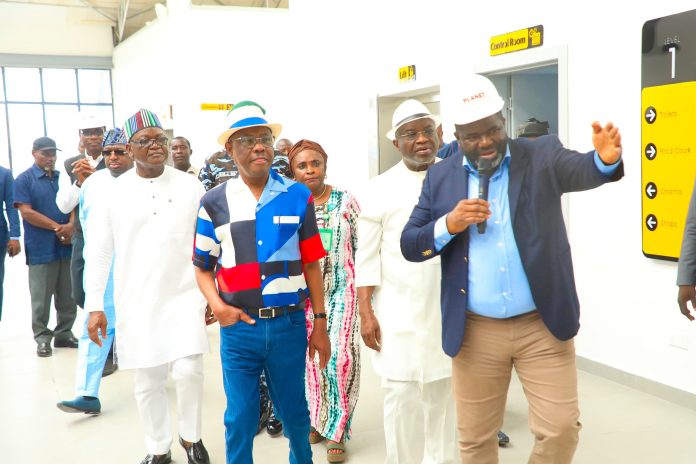…Says Terminals Will Curb Chaos, Restore Order in the FCT
The Minister of the Federal Capital Territory (FCT), Barr. Nyesom Wike, has rolled out a series of bold reforms aimed at reorganizing Abuja’s transport system — starting with the introduction of a painted taxi policy and the development of integrated bus and taxi terminals.
Wike, who spoke during an inspection tour of ongoing infrastructure projects on Friday, said the reforms are designed to enhance public safety, restore sanity to the city’s roads, and align Nigeria’s capital with global urban transport standards.
“Obviously, a lot of things will happen in the transport sector,” the Minister stated. “There will be a lot of reforms. A committee is already working, and before commissioning, we’ll unveil a new framework for the sector.”
A key part of the plan is a colour-coded taxi scheme to clearly differentiate licensed commercial taxis from private vehicles — a move Wike said is central to the FCT’s security strategy.
> “As part of our security measures, we must know those involved in the taxi business and the specific colour they operate. That way, if anything happens, it becomes easier to track and identify,” Wike explained.
The initiative will be complemented by newly constructed multi-modal transport terminals in strategic locations like Kugbo and Mabushi. According to the Minister, these facilities are designed to integrate both bus and taxi operations, eliminating the chaotic roadside parks that have long plagued the city.
> “I told the contractor — this is not just a bus terminal; it must also serve taxis. Commuters should be able to come to a clean, organized terminal and board either a bus or taxi in safety,” he said.
During the inspection, Wike expressed satisfaction with the quality of work at the Kugbo Terminal and praised the indigenous contractor handling the project.
> “I’m very happy with what I’ve seen,” Wike noted. “Some people may ask, ‘Why are they building motor parks?’ But when you travel abroad, you see how things are done. We deserve the same in our capital city.”
> “This isn’t just a motor park. It’s infrastructure that drives urban renewal, enhances security, creates jobs, and restores dignity to the city,” he added.
The Minister also acknowledged earlier design flaws in the project, noting that corrections have since been made.
> “The first time we came here, I was dismayed. But you can’t compare then and now. By the time we return for commissioning, it will be something completely different,” he assured.
The reforms are part of President Bola Ahmed Tinubu’s Renewed Hope Agenda, which prioritizes infrastructure development, security, and urban modernization as pillars for national growth.
Policy analysts have described the initiative as a potential game-changer for Abuja’s public transportation network, which has for years struggled with inefficiency, insecurity, and a lack of coordination.
Wike assured that his administration is working with relevant agencies to ensure proper implementation, enforcement, and sustainability of the new system.
> “We are doing everything possible to make Abuja a model city, not just for Nigeria, but for Africa. The transport sector is a vital component of that vision,” he said.
With the Kugbo terminal nearing completion and others underway, full operation of the new transport scheme is expected to begin in the coming weeks — ushering in a new era for daily commuting in the FCT.

